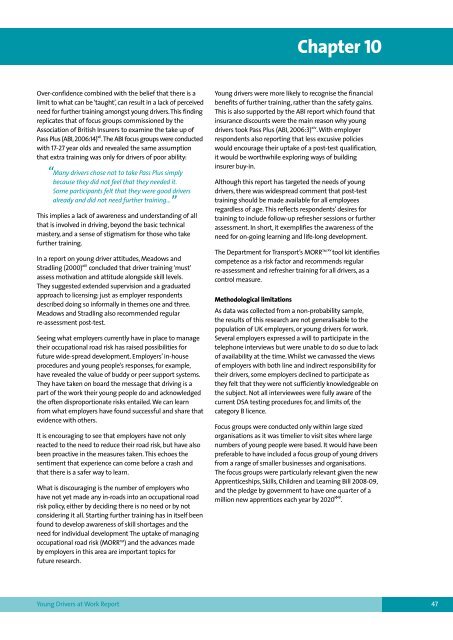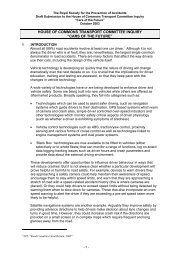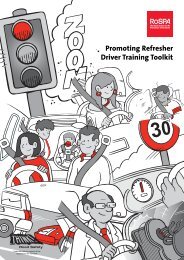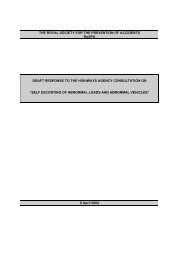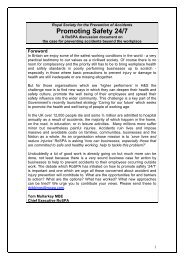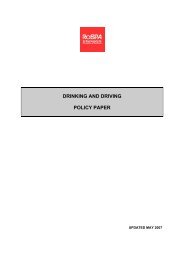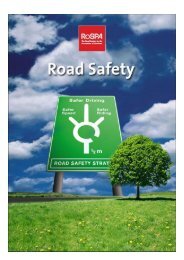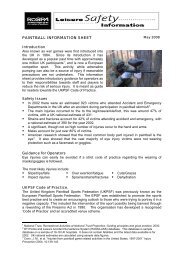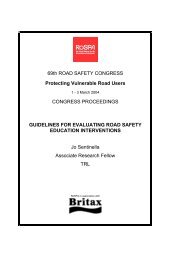RoSPA Young Drivers at Work Report
RoSPA Young Drivers at Work Report
RoSPA Young Drivers at Work Report
You also want an ePaper? Increase the reach of your titles
YUMPU automatically turns print PDFs into web optimized ePapers that Google loves.
Chapter 10<br />
Over-confidence combined with the belief th<strong>at</strong> there is a<br />
limit to wh<strong>at</strong> can be ‘taught’, can result in a lack of perceived<br />
need for further training amongst young drivers.This finding<br />
replic<strong>at</strong>es th<strong>at</strong> of focus groups commissioned by the<br />
Associ<strong>at</strong>ion of British Insurers to examine the take up of<br />
Pass Plus (ABI,2006:14) xii .The ABI focus groups were conducted<br />
with 17-27 year olds and revealed the same assumption<br />
th<strong>at</strong> extra training was only for drivers of poor ability:<br />
“Many drivers chose not to take Pass Plus simply<br />
because they did not feel th<strong>at</strong> they needed it.<br />
Some participants felt th<strong>at</strong> they were good drivers<br />
already and did not need further training... ”<br />
This implies a lack of awareness and understanding of all<br />
th<strong>at</strong> is involved in driving, beyond the basic technical<br />
mastery, and a sense of stigm<strong>at</strong>ism for those who take<br />
further training.<br />
In a report on young driver <strong>at</strong>titudes, Meadows and<br />
Stradling (2000) xiii concluded th<strong>at</strong> driver training ‘must’<br />
assess motiv<strong>at</strong>ion and <strong>at</strong>titude alongside skill levels.<br />
They suggested extended supervision and a gradu<strong>at</strong>ed<br />
approach to licensing: just as employer respondents<br />
described doing so informally in themes one and three.<br />
Meadows and Stradling also recommended regular<br />
re-assessment post-test.<br />
Seeing wh<strong>at</strong> employers currently have in place to manage<br />
their occup<strong>at</strong>ional road risk has raised possibilities for<br />
future wide-spread development. Employers’ in-house<br />
procedures and young people’s responses, for example,<br />
have revealed the value of buddy or peer support systems.<br />
They have taken on board the message th<strong>at</strong> driving is a<br />
part of the work their young people do and acknowledged<br />
the often disproportion<strong>at</strong>e risks entailed.We can learn<br />
from wh<strong>at</strong> employers have found successful and share th<strong>at</strong><br />
evidence with others.<br />
It is encouraging to see th<strong>at</strong> employers have not only<br />
reacted to the need to reduce their road risk, but have also<br />
been proactive in the measures taken. This echoes the<br />
sentiment th<strong>at</strong> experience can come before a crash and<br />
th<strong>at</strong> there is a safer way to learn.<br />
Wh<strong>at</strong> is discouraging is the number of employers who<br />
have not yet made any in-roads into an occup<strong>at</strong>ional road<br />
risk policy, either by deciding there is no need or by not<br />
considering it all. Starting further training has in itself been<br />
found to develop awareness of skill shortages and the<br />
need for individual development The uptake of managing<br />
occup<strong>at</strong>ional road risk (MORR TM ) and the advances made<br />
by employers in this area are important topics for<br />
future research.<br />
<strong>Young</strong> drivers were more likely to recognise the financial<br />
benefits of further training, r<strong>at</strong>her than the safety gains.<br />
This is also supported by the ABI report which found th<strong>at</strong><br />
insurance discounts were the main reason why young<br />
drivers took Pass Plus (ABI, 2006:3) xiv .With employer<br />
respondents also reporting th<strong>at</strong> less excusive policies<br />
would encourage their uptake of a post-test qualific<strong>at</strong>ion,<br />
it would be worthwhile exploring ways of building<br />
insurer buy-in.<br />
Although this report has targeted the needs of young<br />
drivers, there was widespread comment th<strong>at</strong> post-test<br />
training should be made available for all employees<br />
regardless of age. This reflects respondents’ desires for<br />
training to include follow-up refresher sessions or further<br />
assessment. In short, it exemplifies the awareness of the<br />
need for on-going learning and life-long development.<br />
The Department for Transport’s MORR TM xv tool kit identifies<br />
competence as a risk factor and recommends regular<br />
re-assessment and refresher training for all drivers, as a<br />
control measure.<br />
Methodological limit<strong>at</strong>ions<br />
As d<strong>at</strong>a was collected from a non-probability sample,<br />
the results of this research are not generalisable to the<br />
popul<strong>at</strong>ion of UK employers, or young drivers for work.<br />
Several employers expressed a will to particip<strong>at</strong>e in the<br />
telephone interviews but were unable to do so due to lack<br />
of availability <strong>at</strong> the time.Whilst we canvassed the views<br />
of employers with both line and indirect responsibility for<br />
their drivers, some employers declined to particip<strong>at</strong>e as<br />
they felt th<strong>at</strong> they were not sufficiently knowledgeable on<br />
the subject. Not all interviewees were fully aware of the<br />
current DSA testing procedures for, and limits of, the<br />
c<strong>at</strong>egory B licence.<br />
Focus groups were conducted only within large sized<br />
organis<strong>at</strong>ions as it was timelier to visit sites where large<br />
numbers of young people were based. It would have been<br />
preferable to have included a focus group of young drivers<br />
from a range of smaller businesses and organis<strong>at</strong>ions.<br />
The focus groups were particularly relevant given the new<br />
Apprenticeships, Skills, Children and Learning Bill 2008-09,<br />
and the pledge by government to have one quarter of a<br />
million new apprentices each year by 2020 ❘❖❉ .<br />
<strong>Young</strong> <strong>Drivers</strong> <strong>at</strong> <strong>Work</strong> <strong>Report</strong><br />
47


